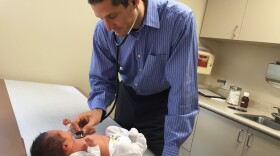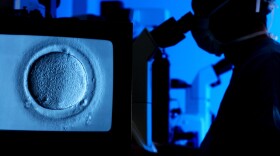Patti Neighmond
Award-winning journalist Patti Neighmond is NPR's health policy correspondent. Her reports air regularly on NPR newsmagazines All Things Considered, Morning Edition, and Weekend Edition.
Based in Los Angeles, Neighmond has covered health care policy since April 1987. She joined NPR's staff in 1981, covering local New York City news as well as the United Nations. In 1984, she became a producer for NPR's science unit and specialized in science and environmental issues.
Neighmond has earned a broad array of awards for her reporting. In 1993, she received the prestigious George Foster Peabody Award for coverage of health reform. That same year, she received the Robert F. Kennedy Award for a story on a young quadriplegic who convinced Georgia officials that she could live at home less expensively and more happily than in a nursing home. In 1990, Neighmond won the World Hunger Award for a story about healthcare and low-income children. She received two awards in 1989: a George Polk Award for her powerful ten-part series on AIDS patient Archie Harrison, who was taking the anti-viral drug AZT; and a Major Armstrong Award for her series on the Canadian health care system. The Population Institute, based in Washington, DC, has presented its radio documentary award to Neighmond twice: in 1988 for "Family Planning in India" and in 1984 for her coverage of overpopulation in Mexico. Her 1987 report "AIDS and Doctors" won the National Press Club Award for Consumer Journalism, and her two-part series on the aquaculture industry earned the 1986 American Association for the Advancement of Science Award.
Neighmond began her career in journalism in 1978, at the Pacifica Foundation's DC bureau, where she covered Capitol Hill and the White House. She began freelance reporting for NPR from New York City in 1980. Neighmond earned her bachelor's degree in English and drama from the University of Maryland, and now lives in Los Angeles.
-
An independent task force chartered by the federal government says pregnant women should be screened for signs of depression both during and after pregnancy.
-
Good CPR requires 100 to 120 chest compressions per minute. If you go too fast or too slow it's not as effective. Researchers say using a metronome helps medical providers maintain the right pace.
-
Residents of North Carolina's "Stroke Belt" headed out with cameras to document why the area is notorious for high rates of heart disease and stroke. They aim to come up with community solutions.
-
More than 70 percent of New Orleans residents say some progress has been made in the availability of medical services since the storm. Still, most say care for the poor continues to lag.
-
For many Americans, an NPR poll suggests, walking is their most consistent exercise. But how much can a moderately paced walk really help your health?
-
The pressure, doctors say, is mostly coming from other parents who don't want their infants exposed to measles, whooping cough or other serious illnesses in the pediatric waiting room.
-
California health officials say more than 4 dozen cases of measles have been diagnosed in the state — a result of an outbreak that started at Disneyland. Most who got sick were not vaccinated.
-
Health officials estimate that every flu season, 1 in 5 Americans will get the bug. This year, changes in flu vaccines and in federal guidelines could help those most susceptible to the virus.
-
For most people, the need for reading glasses is as inevitable as gray hair and wrinkles. Companies are experimenting with corneal implants to improve the ability to focus close up.
-
Until recently, freezing human eggs was reserved for young women at risk of infertility due to cancer treatments. But some companies now pay for it for healthy women who want to delay motherhood.






